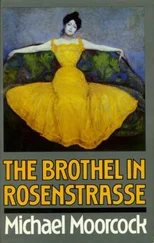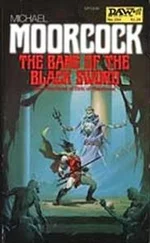Michael Moorcock - The Skrayling Tree
Здесь есть возможность читать онлайн «Michael Moorcock - The Skrayling Tree» весь текст электронной книги совершенно бесплатно (целиком полную версию без сокращений). В некоторых случаях можно слушать аудио, скачать через торрент в формате fb2 и присутствует краткое содержание. Жанр: Фэнтези, на английском языке. Описание произведения, (предисловие) а так же отзывы посетителей доступны на портале библиотеки ЛибКат.
- Название:The Skrayling Tree
- Автор:
- Жанр:
- Год:неизвестен
- ISBN:нет данных
- Рейтинг книги:3 / 5. Голосов: 1
-
Избранное:Добавить в избранное
- Отзывы:
-
Ваша оценка:
- 60
- 1
- 2
- 3
- 4
- 5
The Skrayling Tree: краткое содержание, описание и аннотация
Предлагаем к чтению аннотацию, описание, краткое содержание или предисловие (зависит от того, что написал сам автор книги «The Skrayling Tree»). Если вы не нашли необходимую информацию о книге — напишите в комментариях, мы постараемся отыскать её.
The Skrayling Tree — читать онлайн бесплатно полную книгу (весь текст) целиком
Ниже представлен текст книги, разбитый по страницам. Система сохранения места последней прочитанной страницы, позволяет с удобством читать онлайн бесплатно книгу «The Skrayling Tree», без необходимости каждый раз заново искать на чём Вы остановились. Поставьте закладку, и сможете в любой момент перейти на страницу, на которой закончили чтение.
Интервал:
Закладка:
We were thoroughly relaxed by the second Saturday after we arrived. Brought by the local taxi from Englishtown, we had become wonderfully isolated, with no car and no public transport. I must admit I was so used to activity that after a few days I was a trifle bored, but I refused to become busy. I continued to take a keen interest in the local wildlife and history.
That Saturday we were sitting on the widow's walk of our roof, looking out over Cabot Creek and its many small, wooded islands. One of these, little more than a rock, was submerged at high tide. There, it was said, the local Kakatanawa Indians had staked enemies to drown.
Our binoculars were Russian and of excellent quality, bought on our final visit to Ulric's ancestral estate in the days before the Berlin Wall went up. That afternoon I was able to spot clear details of the individual seals. They were always either there or about to appear, and I had fallen in love with their joyous souls. But, as I watched the tide wash over Drowning Rock, the water suddenly became agitated and erratic. I felt some vague alarm.
The swirl of the sea had a new quality I couldn't identify. There was even a different note to a light wind from the west. I mentioned it to Ulric. Half asleep, enjoying his brandy and soda, he smiled. It was the action of Auld Strom, the avenging hag, he said. Hadn't I read the guide? The Old Woman was the local English name for the unpredictable bore, a twisting, vicious current which ran between the dozens of little islands in the Sound and could sometimes turn into a dangerous whirlpool. The French called her Le Chaudron Noir, the black cauldron. Small whaling ships had been dragged down in the nineteenth century, and only a year or two before three vacationing schoolgirls in a canoe had disappeared into the maelstrom. Neither they nor their canoe had ever been recovered.
A harder gust of wind brushed against my left cheek. The
surrounding trees whispered and bustled like excited nuns. Then they were still again.
"It's probably unwise to take a dip tomorrow." Ulric cast thoughtful eyes over the water. He sometimes seemed, like so many survivors of those times, profoundly sad. His high-boned, tapering face was as thrillingly handsome as when I had first seen it, all those years ago in the grounds of his house during the early Nazi years. Knowing I had planned some activity for the next day he smiled at me. "Though sailing won't be a problem, if we go the other way. We'd have to be right out there, almost at the horizon, to be in real danger. See?" He pointed, and I focused on the distant water which was dark, veined like living marble and swirling rapidly. "The Old Woman is definitely back in full fury!" He put his arm around my shoulders. As always I was amused and comforted by this gesture.
I had already studied the Kakatanawa legend. Le Chaudron was for them the spirit of all the old women who had ever been murdered by their enemies. Most Kakatanawa had been driven from their original New York homeland by the Haudenosaunee, a people famous for their arrogance, puritanism and efficient orga-nization, whose women not only determined which wars would be fought and who would lead them, but which prisoners would live and who would be tortured and eaten. So Auld Strom was a righteously angry creature, especially hard on females. The Kakatanawa called the conquering Haudenosaunee 'Erekoseh', their word for rattlesnake, and avoided the warriors as conscientiously as they did their namesakes, for the Erekoseh, or Iroquois as the French rendered their name, had been the Normans of North America, masters of a superb new idea, an effective social engine, as pious and self-demanding in spirit as they were savage in war. Like the vital Romans and Normans, they respected the law above their own immediate interests. Normans employed sophisticated feudalism as their engine; the Iroquois, a shade more egalitarian, employed the notion of mutuality and common law but were just as ruthless in establishing it. I felt very close to the past that day as I romantically scanned the shore, fancying I glimpsed one of those legendary warriors, with his shaven head, scalp lock, war paint and breechclout, but of course there was no one.
I was about to put the glasses away when I caught a movement and a spot of color on one of the near islands among the thick clusters of birch, oak and pine which found unlikely purchase in what soil there was. A little mist clung to the afternoon water, and for a moment my vision was obscured. Expecting to glimpse a deer or perhaps a fisherman, I brought the island into focus and was very surprised. In my lens was an oak-timbered wattle-and-daub manor house similar to those I had seen in Iceland, the design dating back to the eleventh century. Surely this house had to be the nostalgic folly of some very early settler? There were legends of Viking exploration here, but the many-windowed house was not quite that ancient! Wisteria and ivy showed how many years the two-storied house had stood with its black beams rooted among old trees and thick moss, yet the place had a well-kept but abandoned look, as if its owner rarely lived there. I asked Ulric his opinion. He frowned as he raised the binoculars. "I don't think it's in the guide." He adjusted the lens. "My God! You're right. An old manor! Great heavens!"
We were both intrigued. "I wonder if it was ever an inn or hotel?" Ulric, like me, was now more alert. His lean, muscular body sprang from its chair. I loved him in this mood, when he consciously jolted himself out of his natural reserve. "It's not too late yet for a quick preliminary exploration!" he said. "And it's close enough to be safe. Want to look at it? It'll only take an hour to go there and back in the canoe."
Exploring an old house was just enough adventure for my mood. I wanted to go now, while Ulric was in the same state of mind. Thus, we were soon paddling out from the little jetty, finding it surprisingly easy going against the fast-
running tide. We both knew canoes and worked well in unison, driving rapidly towards the mysterious island. Of course, for the children's sake, we would take no risks if the pull of Le Chaudron became stronger.
Though it was very difficult to see from the shore through the thick trees, I was surprised we had not noticed the house earlier. Our friends had said nothing about an old building. In those days the heritage industry was in its infancy, so it was possible the local guides had failed to mention it, especially if the house was still privately owned. However, I did wonder if we might be trespassing. To be safe we had to avoid the pull of the maelstrom at all costs, so we paddled to the west before we headed directly for the island, where the gentle tug actually aided our progress. Typically rocky, the island offered no obvious place to land. We were both still capable of getting under the earthy tree roots and hauling ourselves and canoe up bodily, but it seemed an unnecessary exercise, especially when we rounded the island and found a perfect sloping slab of rock rising out of the sea like a slipway. Beside it was a few feet of shingle.
We beached easily enough on the weedy strip of pebbles, then tramped up the slab. At last we saw the white sides and stained black oak beams of the house through the autumn greenery. The manor was equally well kept at the back, but we still saw no evidence of occupation. Something about the place reminded me of Bek when I had first seen it, neatly maintained but organic.
This place had no whiff of preservation about it. This was a warm, living building whose moss and ivy threatened the walls themselves. The windows were not glass but woven willow lattice. It could have been there for centuries. The only strange thing was that the wild wood went almost up to its walls. There was no sign of surrounding cultivation-no hedges, fences, lawns, herb gardens, no topiary or flower beds. The tangled old bracken stopped less than an inch from the walls and windows and made it hard going as our tweeds caught on brambles and dense shrubbery. For all its substance, the house gave the impression of not quite belonging here. That, coupled with the age of the architecture, began to alert me that we might be dealing with some supernatural agency. I put this to my husband, whose aquiline features were unusually troubled.
Читать дальшеИнтервал:
Закладка:
Похожие книги на «The Skrayling Tree»
Представляем Вашему вниманию похожие книги на «The Skrayling Tree» списком для выбора. Мы отобрали схожую по названию и смыслу литературу в надежде предоставить читателям больше вариантов отыскать новые, интересные, ещё непрочитанные произведения.
Обсуждение, отзывы о книге «The Skrayling Tree» и просто собственные мнения читателей. Оставьте ваши комментарии, напишите, что Вы думаете о произведении, его смысле или главных героях. Укажите что конкретно понравилось, а что нет, и почему Вы так считаете.









